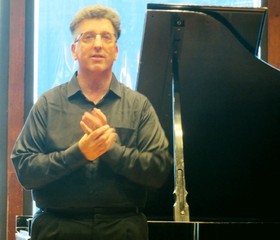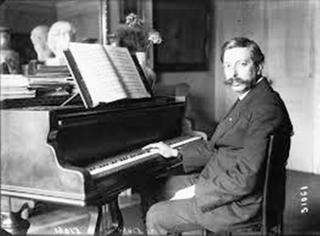|
Back
The Language of Joy New York
BargeMusic
07/12/2019 -
Johann Sebastian Bach: Toccata & Fugue in D Minor, BWV 565
Wolfgang Amadeus Mozart: Sonata No. 5 in G Major, K. 189h [283]
Enrique Granados: From Spanish Dances: No. 5 “Andaluza” – From Goyescas: “Quejas, ó la Maja y el Ruisenor” (“Laments, or The Maiden and the Nightingale”)
Frédéric Chopin: Scherzo No. 3 in C-sharp minor, Opus 39
Jeffrey Biegel (Pianist)

J. Biegel at BargeMusic (© Samuel A. Dog)
“I have drunken deep of joy, And I will taste no other wine tonight.”
Percy Bysshe Shelley (1792-1822)
If Jeffrey Biegel is not a household name, Jeffrey Biegel is a name held in esteem throughout conservatories, concert halls, pianists and the most unerring listeners throughout the world. He is also–oh, direful frightening words–known as a “pianist’s pianist.”
Such a phrase summons up hobgoblins of authority, originalism, pedantic precision. What it does not kindle is the joy with which Mr. Biegel lit up every piece which he played last night at BargeMusic. His Bach fugue literally gave us the translation “fleeting”. His Chopin scherzo was hardly a “joke”, but the plethora of feelings offered his audience a multitude of emotions including, yes, the joy of inspiration.
Mr. Biegel in fact translated notes and chords into feelings, initially satisfying and then startling as Mr. Biegel repeated phrases with seemingly spontaneous changes.
The pianist himself is the stuff of legend amongst the musical beau monde. How he was unable to speak or hear for his first three years before his young genius erupted. How he commissions countless works from countless composers. And how his post at Brooklyn College is a prize for any advanced students.
He also is not afraid to use notes of Baroque and Classical composers as a springboard for personal nuances. That, though, makes perfect sense. Until the time of Liszt, a composer was merely an artisan (“Johann Sebastian, I need three cantatas for the wedding of the Archbishop’s niece. Be quick about it! The wedding is tomorrow.”)
Playing the instrument was the artistry. (“And while you’re at it, you may as well us one of your little toccatas and fugues.”)
Mr. Biegel gave one of Bach’s toccatas and fugues to start the recital with a keyboard mastery that made the Steinway sound like a violin. He never tried to give organ sounds, but performed with the excitement and varied colors of a piano, each repeat with different ornamentation, trills, almost subconsciously audible turns of phrase.
Unexpectedly, the one work in this short recital which will stay forever in my mind was the early Mozart Sonata. All piano students play it, pianists frequently try to make the dynamics more dynamic than necessary.
Mr. Biegel offered the two outer movements with all the animation and perfection necessary. Yet it was the almost naive Andante where Mr. Biegel’s singularity took over. This was pure sonata form, giving Mr. Biegel an opportunity to give us a few turns of phrase in the development. Yet in the last third of the movement, Mr. Biegel transformed his fingers into...well, into feathers. His left hand played the themes, the right hand almost literally dusted the key, like angelic after-thoughts.
At first I was reminded of the slow movement of Schubert’s final sonata. Later, I realized that Mr. Biegel’s genius was akin to that of Fats Waller, who could stride and juice his piano with the left hand, and give the most delicate tinkle at the top. Last night, that delicacy was more than a delight.

E. Granados
So stunning was this Mozart that the following Granados Spanish Dance seemed almost heavy-handed. It wasn’t of course. But the contrast between that Dance and the lugubrious Maiden and the Nightingale with the previous works was not kind to the great Spanish composer.
As mentioned before, the Chopin Third Scherzo gave a variety of moods, clear, beautifully articulated, and–in the splendid chorale–with a raining contrast of notes, each one of which had its own tone, its own coloring.
Now came the single encore. A work of sheer virtuosity à la Mendelssohn Presto or even Liszt. A second theme of a chorale, almost a mirror image of the preceding Chopin chorale. Yet unfamiliar to this listener. It was an Impromptu in C-sharp minor by one Hugo Reinhold. Herr Reinhold lived from 1854 to 1935, studied with Bruckner and was apparently quite popular in his day.
Perhaps, amongst his other beatific treasures to our world Jeffrey Biegel will resurrect Herr Reinhold as more than an encore. In the meantime, his recital last night was a hour of ever-unexpected ever-exuberant joy.
Harry Rolnick
|